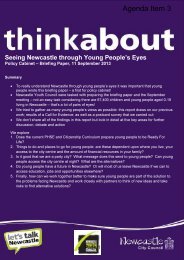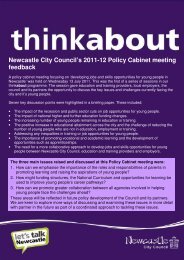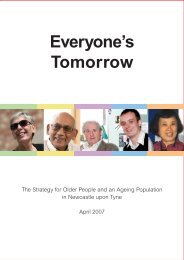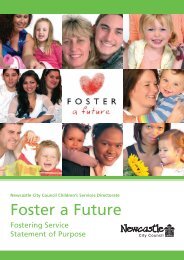NEWCASTLE'S MUSICAL HERITAGE AN INTRODUCTION By ...
NEWCASTLE'S MUSICAL HERITAGE AN INTRODUCTION By ...
NEWCASTLE'S MUSICAL HERITAGE AN INTRODUCTION By ...
Create successful ePaper yourself
Turn your PDF publications into a flip-book with our unique Google optimized e-Paper software.
of his besotted folly. It is lucky the gentleman in question is not so fierce in his<br />
manner as he is described to be in his flute playing, otherwise the reptile might<br />
again have received the chastisement, unhappily too much neglected by his<br />
infatuated parent, and which he has more than once before received from<br />
persons he has insulted; but, alas! you may bray a fool in a mortar and his folly<br />
will not depart from him. Should he persist in his past and present courses, he<br />
may find that the public opinion will force him again upon his travels.<br />
I am, Sir, &c<br />
A CORRESPONDENT’.<br />
Although this exchange of insults between rivals makes for interesting reading<br />
it is not typical of the period and where concert meetings were commented upon<br />
in the press they tended to be self-congratulatory. The Phil-Harmonic was not of<br />
course the only society giving concerts at this time. There was a series of<br />
Miscellaneous Concerts also being given in the Turk’s Head Long Room in 1825,<br />
the Amateur Music Society were doing the same at about the same time and by<br />
November 1826 The Amateur Harmonic Society was giving its twenty-sixth<br />
concert (all songs) in the Joiners Hall. Further down the social scale the<br />
Newcastle and Gateshead Choral Society were giving what they termed as<br />
public exhibitions. The Society proudly boasted that its members came from the<br />
humbler walks of life but in talent and perseverance had set an example worthy<br />
of the highest imitation. It was the choral societies perhaps more than any other<br />
that brought together people from all walks of life with the one aim of making<br />
music. A Mr Ingham was giving concerts in the Music Hall on Blackett Street in<br />
November 1830, under the patronage of the Town Mayor and a Mr Richard Carte<br />
did even better during the period 1839 – 1843 in securing the patronage of Her<br />
Grace, The Duchess of Roxburghe, The Hon Lady Williamson, Lady Blackett,<br />
The Right Worshipful Mayor of Newcastle and The Sheriff of Newcastle for a<br />
series of Grand Subscription Concerts in the Assembly Rooms. So the musical<br />
life of Newcastle went on through the 1840s and the 1850s with the Newcastle<br />
Sacred Harmonic and Choral Society giving performances of the ever popular<br />
‘Messiah’ in the Music Hall, Nelson Street and the Temperance Choral Society<br />
(one imagines not very well supported in Newcastle) announcing a Musical<br />
Soiree on Boxing Day 1849 with the words ‘TEA ON THE TABLES AT 5<br />
O’CLOCK’ prominently printed on their leaflet.<br />
In the 19 th Century concerts also took place in the theatres of Newcastle,<br />
which with the opening of the first Theatre Royal in Mosley Street on the 26 th<br />
January 1788 became a great attraction for the growing pleasure seeking society<br />
of the early 1800s. That is not to say that the concerts put on in the theatres were<br />
all froth, far from it. The Theatre Royal, Mosley Street presented a grand concert<br />
of selections from Handel’s sacred oratorios on 3 rd March 1819, between two<br />
plays and seven days later repeated the formula. In August 1840 a series of<br />
Promenade Concerts were tried in the Theatre Royal, Grey Street but proved to<br />
be a dismal failure. However, other performances seem to have proved more<br />
38

















